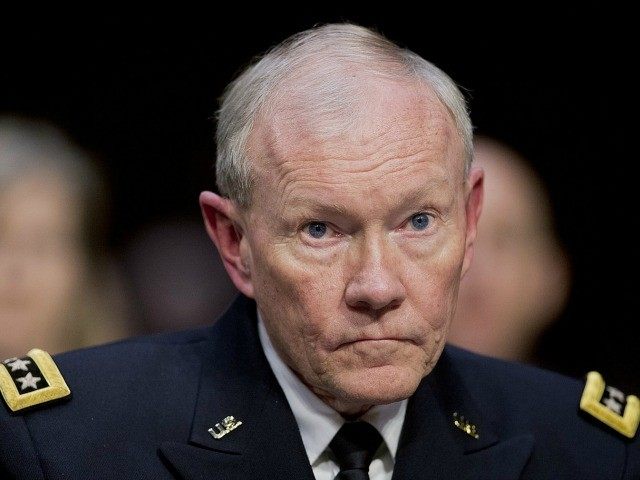Gen. Martin Dempsey, the highest-ranking military officer in the U.S. armed forces, and Afghan President Ashraf Ghani discussed the possibility of forming a ten-year regional counterterrorism effort against the Islamic State (ISIS/ISIL).
The discussion between the Afghan leader and the chairman of the Joint Chiefs of Staff, which could be construed as a sign of a long-term U.S. military presence in Afghanistan beyond what has been planned, took place in Kabul on July 19.
Currently, the U.S. military is scheduled to draw down to a Kabul-based embassy presence by the end of 2016, a move announced by President Obama that has been described as the final exit from Afghanistan for the U.S. armed forces.
Gen. Dempsey reportedly said there is a clear need for a regional counterterrorism strategy to combat ISIS that includes Afghanistan. He believes the fight against the jihadist group is “generational,” requiring a ten-year commitment.
“I think we’re all having an important discussion on how to address the transregional nature of what is clearly a persistent threat that has to be addressed at a sustainable level of effort over a period of time,” Dempsey told reporters traveling with him on July 19, DOD News, the Pentagon’s media arm, reported.
“Dempsey has said for years the United States should address this transregional threat with a transregional strategy,” noted the report. “ISIL began in Iraq and Syria, but has spread to the Sinai, Libya and into Nigeria. Now the group is recruiting in Afghanistan and Pakistan.”
During their meeting, Dempsey said Ghani told him that Afghanistan could serve as a regional center in a regional counterterrorism network that includes the Levant, Iraq, North Africa, and West Africa.
“His view is, ‘Hey, look, I’m a willing partner in an area where you may not have willing partners,’” said the general.
Gen. Dempsey said he would like American leaders to discuss what the objective of the ten-year effort would be.
“Once we have a clear idea of what we would like to accomplish … over a 10-year period,” he said, “then we should discuss what authorities would be needed … as well as what resources can be applied.”
“I don’t want to do this one year at a time,” he added, reportedly noting that dealing with ISIS “is a generational fight and the level of resources supplied must be sustainable over 10 years.”
The U.S. is scheduled to reduce its military presence in Afghanistan to a small force charged with protecting the American embassy by the end of next year.
President Obama, at the request of his Afghan counterpart, already made changes to the U.S. withdrawal pace, extending the presence of nearly 10,000 troops until the end of this year.
In 2014, Obama said that by the end of 2015, the U.S. would draw down to about half of the current level. The U.S. military has been engaged in Afghanistan since October 2001, making the conflict America’s longest war.
Ghani “wants to continue to build” Afghanistan’s counterterrorism capabilities “and knows that he needs our help to do that,” said U.S. Gen. John F. Campbell, the top commander of international forces in Afghanistan, while briefing the reporters traveling with Gen. Dempsey on July 19. He added that Afghan forces still need training and equipment, after more than a decade and $60 billion-plus in U.S. taxpayer funds have been devoted to developing them.
The 2015 fighting season in Afghanistan, the first with the country’s forces totally in the lead, is about halfway though.
President Obama has asked Campbell to reassess the situation on the ground when the fighting season ends.
ISIS’s presence in Afghanistan is worrisome, acknowledged the commander. He also conceded that the ISIS threat in the country is growing.
“Late last year, we first started hearing about ISIL, and in the last six or seven months, there is a drumbeat that has continued to grow,” he told reporters.
“We said the ISIL threat was nascent, but now I would say it is probably operationally emergent,” Campbell also said, adding that the Afghan president believes it is a potential threat to Afghanistan.
Nevertheless, Campbell declared that neither the Taliban nor ISIS will take over Afghanistan.
“They are not an existential threat to Afghanistan at this point,” he said. “Could they become that down the road? I don’t know.”

COMMENTS
Please let us know if you're having issues with commenting.